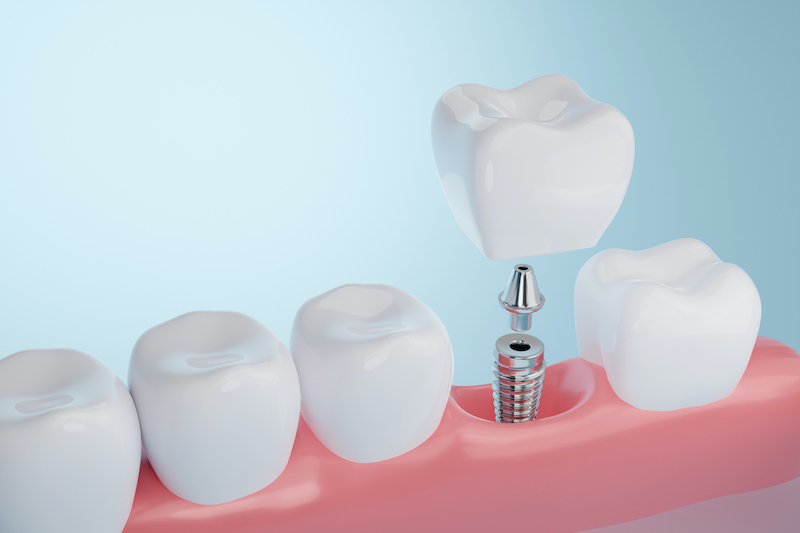
Although veneers and implants can both improve your smile. The difference between veneers and implants is that veneers only cover the front surface of your teeth while dental implants replace missing teeth altogether. If you lose a tooth due to disease or injury, your dentist may surgically insert a dental implant into your jawbone. If your primary concern is cosmetic, however, you can have a dentist apply veneers to conceal discoloration, gaps, or chips in your natural teeth. In this article, we will explain the differences between veneers and implants in more detail, and suggest alternatives that you may not have considered.
Table of Contents
- Veneers vs implants
- What are dental veneers?
- What are dental implants?
- How to choose between implants and veneers
- Alternatives to veneers and implants
- Restore confidence in your smile
Veneers vs. Dental Implants
The following comparison chart explains the key differences between implants and veneers.
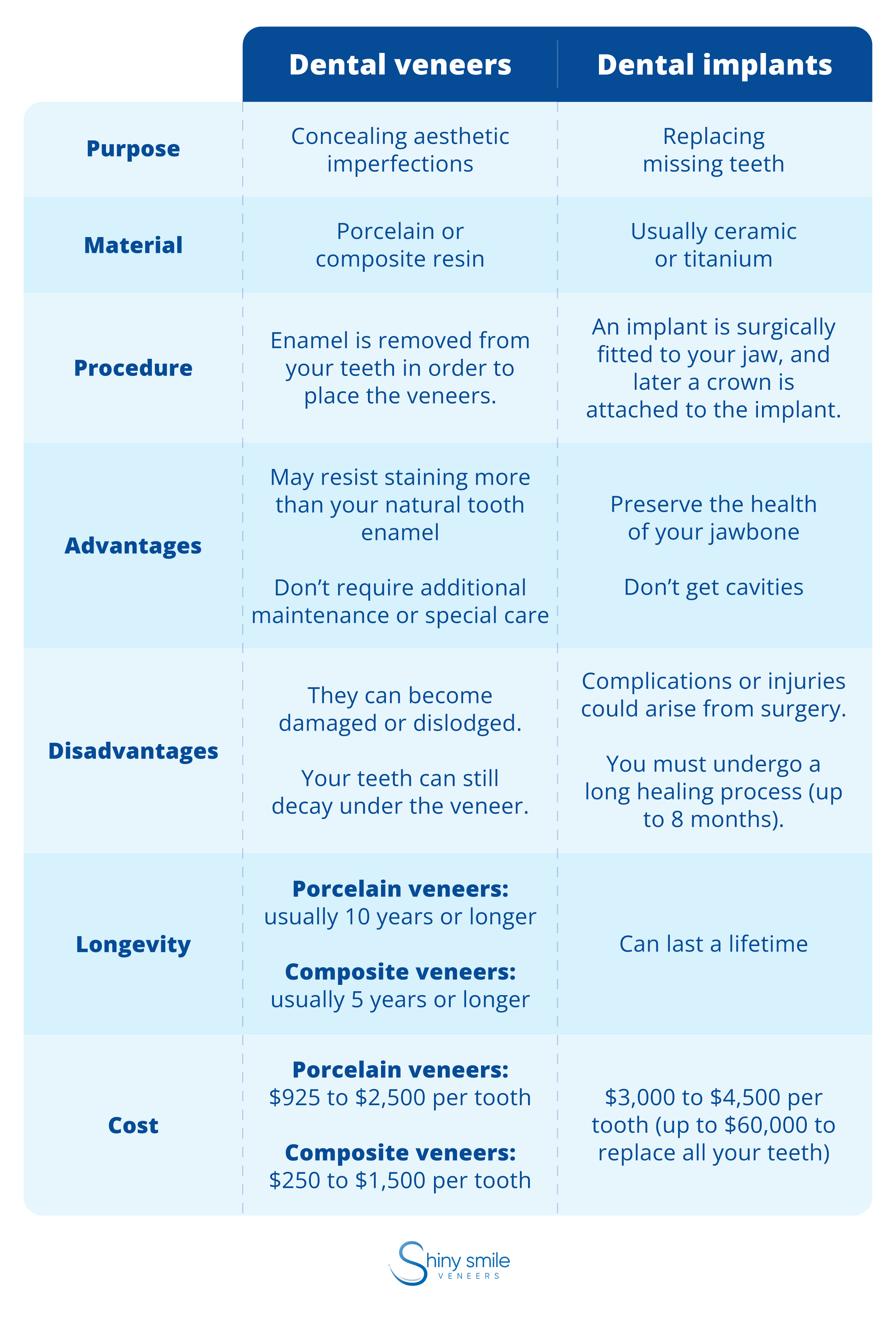
The option that is right for you depends primarily on your dental health concerns. If you need a tooth replaced with a dental implant and then opt for veneers to improve the look of your teeth, you may even find yourself using both treatments.
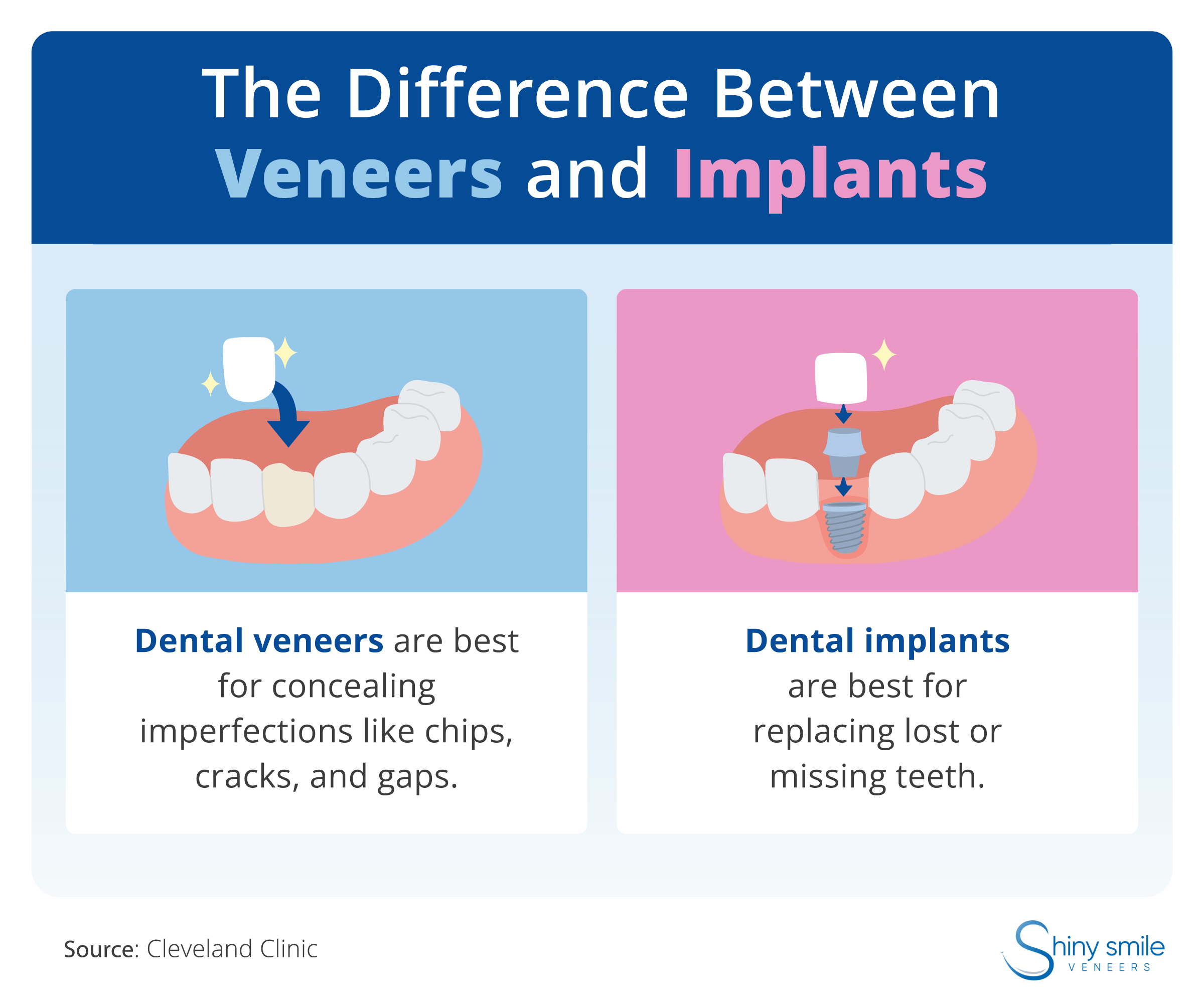
What Are Dental Veneers?
Dental veneers are thin shells applied to the front surface of the tooth to conceal aesthetic imperfections such as chips, cracks, gaps, discoloration, or teeth that are misshapen or too small. They typically consist of tooth-colored porcelain or composite resin. Most types of veneers are permanent because placing them involves removing some of your natural tooth enamel. Veneers are usually not suitable for people with serious oral health issues, like extensive cavities or gum disease.
Procedure
Getting veneers requires at least two dental appointments. At the first visit, your dentist will prepare your teeth by removing small amounts of enamel. If you choose porcelain veneers, they will take impressions of your teeth and send them to a dental lab to make custom veneers. This process can take a few weeks, and you may need to wear temporary veneers while you wait. At the second visit, your dentist will bond the veneers to your natural teeth. You can eat, drink, and return to normal life immediately after your appointment.
Advantages and Disadvantages
While veneers can give you a beautiful smile, the procedure comes with some potential downsides. Before deciding if this dental treatment is right for you, you may want to consider both the pros and cons of veneers.
Advantages:
- Veneers produce a natural-looking smile.
- Porcelain veneers resist staining more than your natural tooth enamel.
- Neither porcelain nor resin veneers require additional maintenance or special dental care.
Disadvantages:
- The procedure is usually permanent and you’ll lose some of your natural enamel.
- Your teeth may become more sensitive to hot and cold food and drinks.
- The veneers can fall off or become dislodged.
- Your teeth can still decay under the veneer.
How Long Do They Last?
The dental veneer process is typically irreversible, but the veneers themselves will need to be replaced as they wear out. While you will want to avoid abusing your veneers (like crunching whole carrots or drinking lots of dark liquids), no additional care is required to maintain them. Porcelain veneers can typically last 10 years or longer without needing replacement (studies show they may last up to 20 years). Composite veneers, on the other hand, usually last 5 years or longer.
Cost
Because veneers are considered cosmetic dentistry, your insurance may not cover them. Long-lasting porcelain veneers cost approximately $925 to $2,500 per tooth. The less durable composite veneers cost around $250 to $1,500 per tooth. Remember that no veneers will last forever, and you will incur additional costs if you replace them.
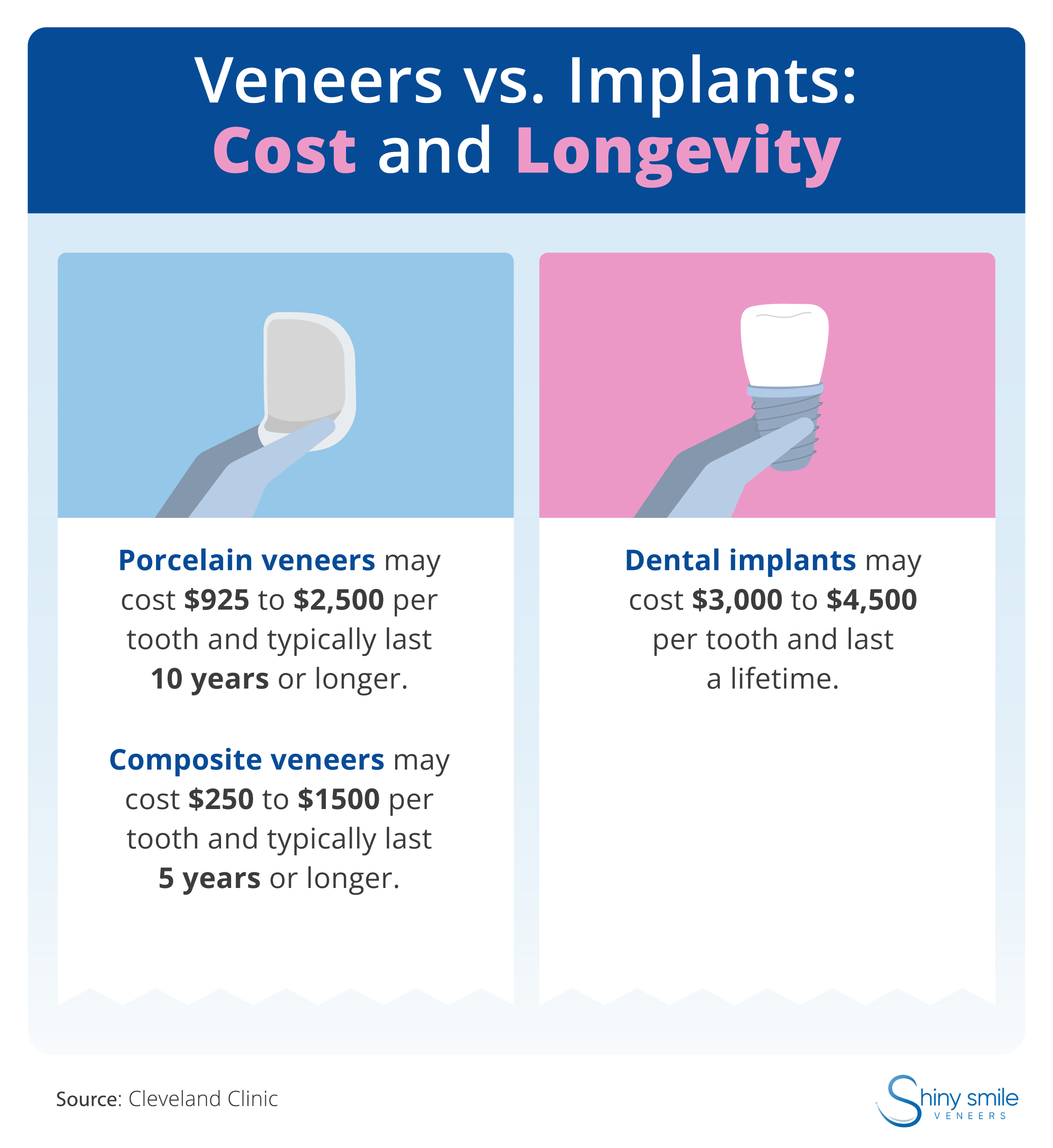
What Are Dental Implants?
Dental implants are artificial tooth roots placed into your jaw to provide support for prosthetic teeth such as crowns, bridges, and dentures. Dental implant systems are often made of titanium or zirconium oxide (a type of ceramic). The replacement tooth (called a dental crown) placed on top can be made out of metal, porcelain, resin, or ceramic.
Designed for people who are missing one or more teeth, implants can help with dental issues caused by tooth loss, such as restoring the ability to chew, stopping the jawbone from shrinking, and keeping nearby teeth stable. Dental implants are suitable for most people in good health who have healthy gums. Patients with chronic illnesses may not be suited for the procedure, as their conditions could affect how the implants heal after surgery. Using tobacco can also slow the recovery process.
Procedure
The dental procedure involves a periodontist surgically placing the implant into the jawbone. As the surrounding bone heals, it grows around the implant and holds it in place. This is called osseointegration and helps produce strong results. When the area has healed (six weeks to six months later), a customized new tooth (called a dental crown) is fitted to the implant. The crown is designed to fit with the color and shape of your other teeth. The crown-fitting process may take another two months to heal. If you’re replacing several teeth, your dentist may opt to fit a bridge or dentures to the implants instead.
Advantages and Disadvantages
Dental implants can give you a healthy smile and improve your quality of life, but the implant process has some risks. Before signing up for a dental implant, you’ll want to talk to your dentist about the advantages and disadvantages of the procedure.
Advantages:
- Implants are secure and blend in with your natural teeth.
- They preserve the health of your jawbone.
- Implants address problems caused by missing teeth (such as chewing difficulties).
- As the teeth are prosthetic, they don’t get cavities.
Disadvantages:
- Surgery could result in injury to your jaw, gums, or surrounding teeth.
- Post-surgical complications can occur, including infection or numbness caused by nerve damage.
- The teeth may not work properly, such as feeling that you do not have a normal bite. This will happen if the implant is not placed in the correct place.
- If the implant screw loosens, the artificial tooth may feel loose.
- The healing process may take several months, during which time you’d have a temporary crown in place of the permanent one.
How Long Do They Last?
Dental implants are considered a long-term solution. After you have healed, implants can last a lifetime if you properly care for them. Following the oral hygiene instructions of your dentist (including flossing, brushing, and cleaning the implant area) can help ensure a long-lasting implant.
Cost
The cost of dental implants depends on several factors, including the type of implant needed and where you have the procedure done. On average, the cost ranges from $3,000 to $4,500 per tooth. Replacing all or most of your teeth as an alternative to dentures could cost up to $60,000. Note that dental implants are often considered a cosmetic procedure and may not be covered by your insurance (although there are exceptions).
How to Choose Between Implants and Veneers
When evaluating your treatment options, your dental goals, medical conditions, and budget can all influence your decision. You may want to consider the following factors when deciding which procedure makes the most sense for you:
- Tooth damage: Implants are best for severely damaged or missing teeth, but veneers can conceal smaller imperfections like chips and cracks.
- Health: Veneers are suitable for most people with good oral health, but implants may not be ideal if you have bone loss or chronic illness or if you smoke.
- Recovery: Veneer placement doesn’t require any downtime, whereas dental implants involve a surgical procedure that can take six weeks to six months to heal.
- Longevity: Veneers may last 5 to 20 years, depending on the material, but implants can last a lifetime.
- Cost: Implants are more expensive than veneers.
If neither dental implants nor veneers are right for you, there are other options available.
Alternatives to Veneers and Implants
To improve your smile, you don’t necessarily have to choose between veneers or implants. Depending on your goals and concerns, the following options may suit your dental needs.
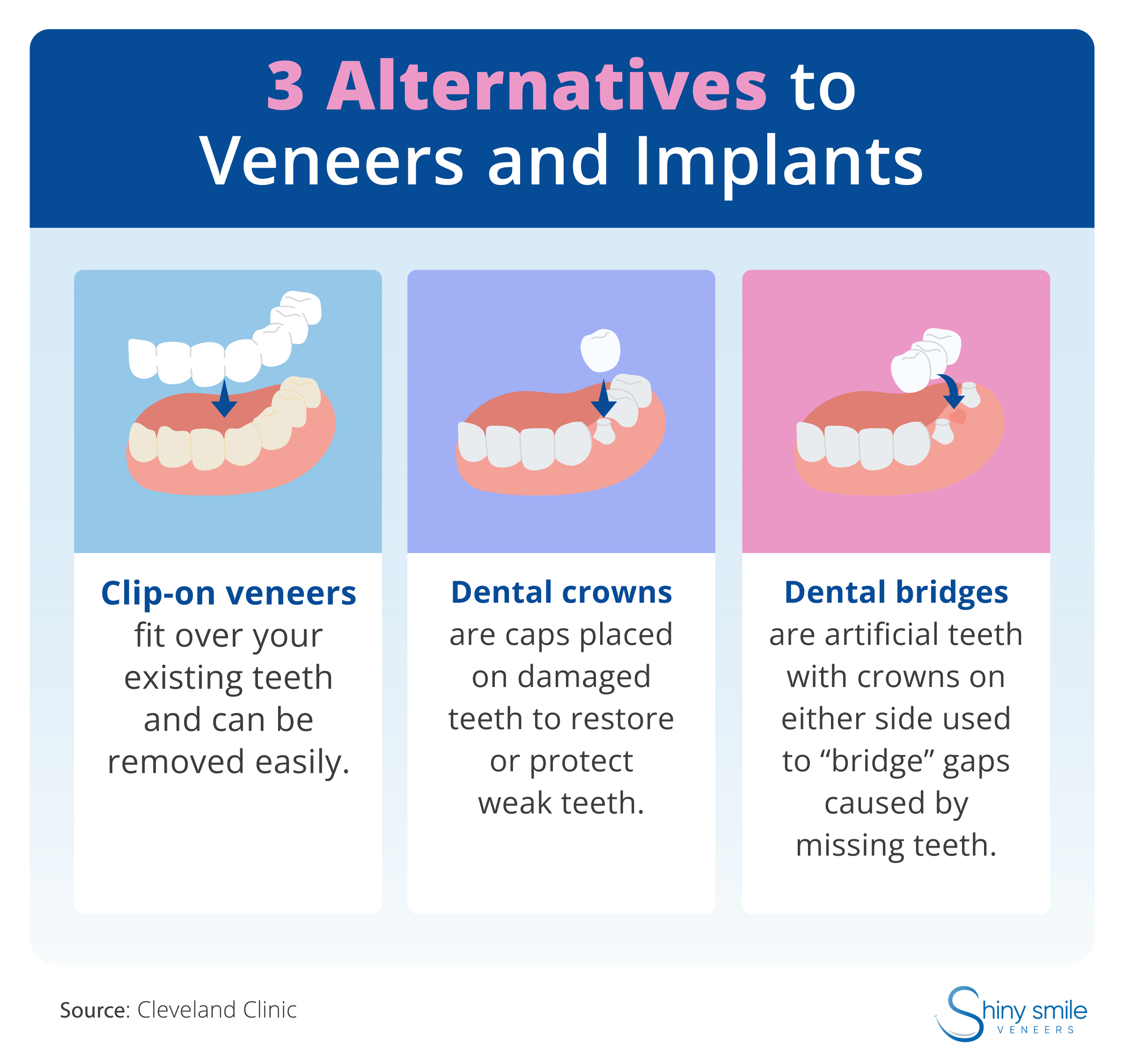
Snap-on Veneers
Snap-on, or clip-on, veneers fit over your existing teeth like a mouth guard. The price of snap-on veneers is much more affordable than veneers and implants, with Shiny Smile Veneers costing $570. Snap-ons last one to five years with regular use, maybe longer depending on how often you wear them. They are easily removable and replaceable, and you don’t lose any of your natural enamel as you do with traditional veneers. Finally, you can take the impressions at home, which means you don’t have to go to a dentist, undergo surgery, or risk any discomfort or complications for your new smile.
Dental Crowns
If you have a broken, weak, or severely discolored tooth (or one that has undergone a root canal), your dentist may choose to cover the whole surface with a dental crown. Dental crowns are caps placed on top of damaged teeth when fillings aren’t enough to solve the problem. A variation on traditional crowns, onlays and three-quarter crowns don’t cover as much of your tooth and can be used when you still have a solid tooth structure. They only require removal of the damaged area and offer a more conservative approach than covering the entire tooth. At $800 to $1,500 per crown, dental crowns are also cheaper than veneers and implants.
Dental Bridges
Designed to fill the space caused by missing teeth, dental bridges use one or more artificial teeth attached to crowns on either side of the gap. For a successful bridge, you need healthy teeth on either side of the missing ones. Bridges can help when you have missing teeth due to gum disease, tooth decay, injury, or congenital conditions. There are different types of bridges for different dental problems. Your dentist may recommend a bridge or implants (or both) depending on the specific issue with your teeth.
Restore Confidence in Your Smile
Veneers are typically a cosmetic treatment, while dental implants are a surgical procedure. Which treatment you need depends on the severity of your issue, your health status, and your personal preferences. Alternative options to improve your smile include other types of crowns, bridges, and snap-on veneers. Shiny Smile offers custom-made snap-on veneers that fit easily over your teeth and give you a perfect smile without visiting a dentist. Snap-on veneers provide a convenient, affordable solution that can restore your confidence in your smile.
